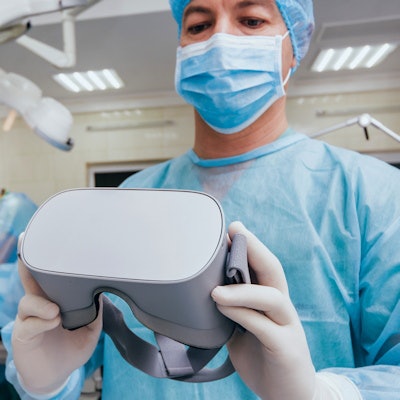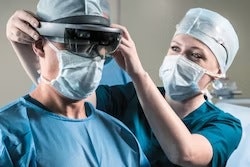
Virtual-reality (VR) models based on preoperative imaging studies can improve planning and surgeon confidence in complex surgical oncology procedures, according to research published August 2 in the Journal of Surgical Research.
In a retrospective and prospective study, a team of researchers led by Vadim Lyuksemburg, MD, of the University of Illinois College of Medicine at Peoria compared the results of surgeries planned first using traditional 2D preoperative imaging and then with VR models created from the same studies. They found that VR yielded a more accurate preoperative plan than 2D images alone, while also increasing the confidence of both operating and consulting surgeons.
"Virtual reality modeling is feasible and may improve preoperative planning compared to 2D imaging," the authors wrote.
To assess feasibility, the researchers first retrospectively created VR models using preoperative CT or MRI exams from seven patients who had received complex oncologic resections at their institution. Once they determined VR models were feasible for creating preoperative plans, they then prospectively enrolled 13 patients who had operative plans considered to be difficult to define preoperatively. These patients included seven with liver tumors, three with retroperitoneal tumors, two with gastric tumors, and one with a pancreatic tumor.
The operating surgeon and consulting surgeon created operating plans first using just the 2D images and then with a VR model. All VR models were successfully created for the 13 prospective patients; a model could not be generated for one of the retrospective patients due to a low-quality image. The researchers then compared the concordance of both surgical plans with the actual operation and quantified the confidence of the surgeons in the plans for all 20 patients.
| Results from complex oncology surgeries planned using 2D images or VR models | ||
| Type of clinician | 2D images | VR models |
| Concordance with operation | ||
| Operating surgeons | 54% | 92% |
| Consulting surgeons | 23% | 69% |
What's more, the operating surgeons had an average of 15% improvement in confidence in the surgical plan and the consulting surgeons had an average of 8% higher confidence.
"Nearly all cases for the operative surgeon and most for the consulting surgeon had improved levels of confidence in the operative plan with virtual reality compared to 2D imaging," the authors wrote.
The authors noted that VR models can be created based on traditional imaging protocols even in areas of complex anatomical variations. High-quality 2D images are required, however. Also, VR models can help to precisely localize the tumor location in the operating room in patients with very-small tumors that may be difficult to identify during surgery, according to the researchers.
"Quality [VR models] are based on quality 2D images, and patients with smaller tumors difficult to localize or tumors that are adjacent to critical structures are more likely to benefit from [VR models] for preoperative surgical planning," the authors wrote. "Lastly, [VR models] may be more accurate than 2D imaging in formalizing a preoperative plan, and future studies are warranted to investigate its utility."
The full journal article can be found here.





















